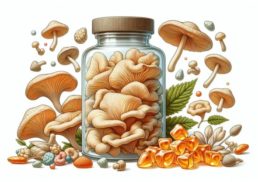Have you ever wondered why a warm cup of green tea can make you feel so relaxed and focused? The answer lies in a naturally occurring amino acid called L-Theanine. L-Theanine offers a range of health benefits, including cognitive enhancement, stress relief, and immune support, all without causing drowsiness. In this blog post, we will explore the scientific basis behind these benefits and provide practical guidelines for incorporating L-Theanine into your daily routine.
Table of Contents
Key Takeaways
L-Theanine is a naturally occurring amino acid found in green tea and mushrooms, with potential health benefits such as cognitive function improvement, stress relief, blood pressure reduction and neuroprotective effects.
Clinical evidence suggests that L-Theanine can reduce symptoms of anxiety and stress while improving cognitive performance for executive functions like decision making.
The recommended dosage of L-Theanine for healthy adults is 200 (400mg per day for 4) 8 weeks. Special considerations should be taken when determining the appropriate dose according to individual needs or specific populations.
Understanding L-Theanine: Origin and Properties

L-Theanine is a distinctive naturally occurring amino acid that can be found in green tea. It’s also present in some mushroom varieties. As a functional food additive, it has been extensively researched for its potential health benefits, including:
Cognitive function improvement
Stress relief
Blood pressure reduction
Neuroprotective effects
The consumption of green and black tea, rich in L-Theanine, has been associated with various health benefits, making green tea consumption a popular choice for those seeking a natural way to support their well-being.
We’ll now examine the natural sources and chemical properties of this intriguing compound more closely.
Natural sources of L-Theanine
Green tea leaves are the primary source of L-Theanine, with a regular serving containing approximately 6.56 milligrams of this amino acid. Other sources of L-Theanine include certain mushroom species, such as:
Lion’s Mane
Reishi
Chaga
Cordyceps
However, these mushrooms contain L-Theanine in smaller amounts.
Interestingly, green tea typically contains higher levels of L-Theanine compared to black tea, making it an even more potent source of this beneficial compound.
Chemical structure and properties
L-Theanine’s chemical structure is similar to that of glutamate, an excitatory neurotransmitter. This similarity allows it to cross the blood-brain barrier and directly interact with the brain. By affecting neurotransmitter levels such as GABA, dopamine, and serotonin, L-Theanine can influence mood, sleep, and emotion.
Furthermore, its neuroprotective effects may contribute to improving cognitive processes like attention and potentially reducing the risk of ischemic delayed neuronal death in individuals with mild cognitive impairment.
Cognitive Performance Enhancement with L-Theanine
One of the most intriguing aspects of L-Theanine is its potential to enhance cognitive performance. Research suggests that this amino acid may improve attention, memory, and executive functions, making it an appealing option for those seeking a natural cognitive boost.
We’ll now look at the diverse ways in which L-Theanine can bolster various facets of cognitive performance.
Attention and focus
For centuries, people have turned to green tea for its ability to increase alertness and focus. Studies suggest that the combination of L-Theanine and caffeine, both naturally occurring in green tea, can significantly improve attention and reduce fatigue. This synergistic effect makes it a popular choice for those seeking a natural alternative to conventional stimulants for enhanced cognitive performance. With caffeine stimulation evaluated, it becomes clear why green tea is a preferred option for many.
Memory improvement
While some evidence points towards L-Theanine’s potential to improve memory, more research is needed to confirm these effects. However, it is worth noting that L-Theanine has been shown to improve attention, working memory, and executive functions, all of which can contribute to better memory performance.
Executive function support
Executive functions, such as decision-making and problem-solving, are crucial for success in various aspects of life. L-Theanine’s potential to support these functions comes from its ability to modulate neurotransmitter levels and improve attention and working memory.
This makes L-Theanine an attractive option for individuals looking to enhance their cognitive skills and overall mental performance.
L-Theanine for Stress Relief and Relaxation

In today’s fast-paced world, finding natural ways to relieve stress and promote relaxation is more important than ever. L-Theanine is a unique compound that can help achieve this goal without causing drowsiness, making it a popular option for those seeking a natural stress-relief solution.
We’ll now consider the mechanisms driving L-Theanine’s stress-relieving properties and the clinical proof validating its efficacy.
Mechanism of action
L-Theanine works its magic by influencing neurotransmitters in the brain, such as GABA, dopamine, and serotonin. By modulating these brain chemicals, L-Theanine promotes relaxation and reduces stress, making it a valuable ally for those dealing with anxiety, depression, or chronic stress.
Clinical evidence
While clinical evidence supports L-Theanine’s stress-relieving properties, more research is needed to fully understand its potential benefits. Nevertheless, studies have shown that L-Theanine can improve anxiety symptoms, including those related to generalized anxiety disorder, and stress outcomes, as well as cognitive function and working memory, making it a promising option for those seeking a natural solution for stress relief.
L-Theanine and Sleep Quality

Sleep is essential for overall health and well-being, and L-Theanine may play a supportive role by improving sleep quality and helping with sleep issues related to ADHD.
We’ll now delve into the sleep-enhancing properties of L-Theanine and its potential benefits for those with ADHD-associated sleep problems.
Sleep-promoting properties
L-Theanine promotes relaxation, which can lead to better sleep quality. Research indicates that it can heighten sleep quality without causing sleepiness during the day, making it an appealing option for those looking to improve their sleep without resorting to sedatives.
Effects on ADHD-related sleep issues
Studies suggest that L-Theanine may offer hope for boys with attention deficit hyperactivity disorder (ADHD) who struggle with sleep problems. Research has shown that daily supplementation with L-Theanine can improve certain aspects of sleep quality in boys diagnosed with ADHD, making it a potential natural solution for those dealing with this common issue.
Learn more, visit ADHD and Sleep Problems: Why You’re Always Tired.
Immune System Boosting and Anti-Inflammatory Effects
Beyond its cognitive and stress-relieving benefits, L-Theanine may also support the immune system and have anti-inflammatory effects.
We’ll now discuss L-Theanine’s ability to strengthen immunity and its potential anti-inflammatory attributes.
Supporting the immune system
L-Theanine can support the immune system by:
Fighting illness
Reducing the risk of infections
Changing the TH2/TH1 cytokine balance
Increasing the production of dopamine and serotonin
L-Theanine may help enhance immune function and protect against common colds, flu, and bacterial infections.
Anti-inflammatory effects
L-Theanine may have anti-inflammatory properties, but more research is needed to confirm its effects. Some studies have indicated that L-Theanine can reduce inflammatory responses by down-regulating mRNA expression of pro-inflammatory cytokines and inhibiting the expression of pro-inflammatory mediators.
L-Theanine and Weight Loss
L-Theanine may also aid in weight loss by suppressing appetite and working synergistically with green tea catechins.
We’ll now discuss L-Theanine’s ability to suppress appetite and its possible synergistic relationship with green tea catechins in the context of weight loss.
Appetite suppression
L-Theanine’s umami flavor may help reduce appetite, contributing to weight loss. Research has indicated that L-Theanine produces a pleasant taste, thus reducing appetite and potentially supporting weight loss.
Synergy with green tea catechins
L-Theanine and green tea catechins may work together to promote weight loss. Studies have demonstrated that green tea has advantageous effects against obesity, and compounds such as EGCG and L-theanine in green tea may be beneficial for weight loss.
Potential Interactions and Side Effects of L-Theanine
While L-Theanine is generally considered safe, it is important to be aware of potential side effects and drug interactions.
We’ll now discuss the recognized side effects of L-Theanine and possible interactions with medications.
Known side effects
Mild side effects of L-Theanine may include headache or sleepiness. However, it is generally well-tolerated, and most people can use it without experiencing any adverse effects.
Drug interactions
L-Theanine may interact with blood pressure medications and sedatives, so caution is advised. It is important to consult with your healthcare provider prior to taking L-Theanine if you are on any medications, as it may interact with medications for high blood pressure, sedatives, and psychiatric medications.
L-Theanine Dosage Recommendations
L-Theanine dosage recommendations vary depending on individual needs and specific populations. We’ll now provide some general dosage guidelines for L-Theanine and touch on special considerations for certain populations.
General dosage guidelines
General dosage guidelines suggest taking 200-400mg of L-Theanine daily for a period of 4-8 weeks. This dosage range is typically considered safe and effective for healthy adults seeking to experience the cognitive, stress-relieving, and immune-boosting benefits of L-Theanine.
Special considerations for specific populations
Pregnant or breastfeeding women, children, and those with certain medical conditions should consult a healthcare provider for personalized advice on L-Theanine dosage.
While studies have suggested that L-Theanine may be safe for children and individuals with ADHD-related sleep issues, it is always best to seek expert guidance to determine the appropriate dosage for your specific needs.
Summary
In conclusion, L-Theanine is a versatile and beneficial amino acid with a range of potential health applications. From cognitive enhancement and stress relief to immune support and weight loss, L-Theanine offers a natural and safe way to support overall well-being. As with any dietary supplement, it is essential to consult with a healthcare provider before starting a new regimen and to follow dosage guidelines to ensure optimal results.
Frequently Asked Questions
What is theanine taken for?
L-theanine is an amino acid taken to reduce anxiety, increase concentration, improve sleep quality, stabilize mood, and even help with ADHD. Studies have also shown that it may sharpen thinking when combined with caffeine, and promote a sense of calm and relaxation.
Is it OK to take L-theanine daily?
It is generally considered safe to take up to 500 mg of L-theanine daily, but it’s not recommended that you exceed this amount. Consult with a healthcare professional to determine the appropriate dosage for your individual needs.
What are the side effects of L-theanine?
L-theanine can cause nausea, an upset stomach, irritability, lower blood pressure, appetite loss, diarrhea, difficulty in concentration, headaches, and liver toxicity in extreme high doses.
Does L-theanine get rid of anxiety?
L-theanine has been known to reduce stress and anxiety symptoms when taken at doses of 50 to 200mg, with the calming effect lasting 8 to 10 hours. Several small studies have indicated that it may be a beneficial treatment for anxiety, although further large studies are needed to confirm this. It is not a cure for anxiety, but should be used as part of an overall anxiety treatment plan prescribed by a doctor.
Is L-Theanine safe for children?
It is generally considered safe for children to take L-Theanine, however, it is important to consult a healthcare professional before administering any supplement.









